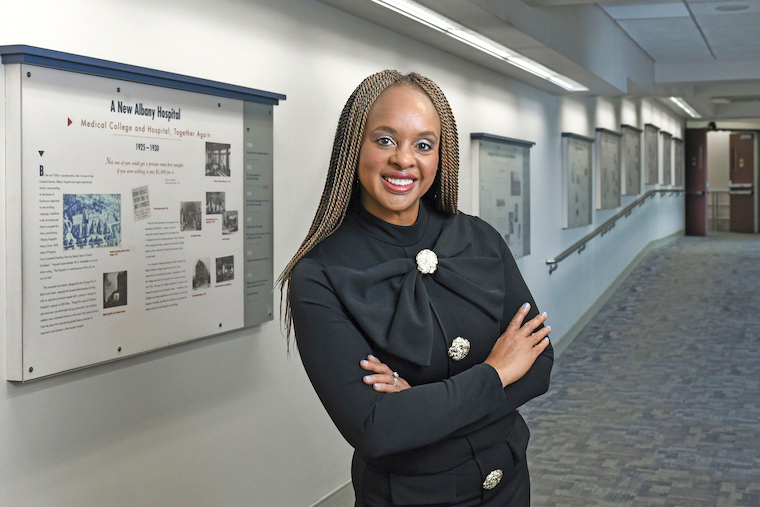More than 25 years ago, KMarie King, MD ’98, observed Steven Strasberg, MD, now professor emeritus of surgery at WashU Medicine, carefully lay out sutures during a bile duct reconstruction surgery. A third-year medical student at the time, King was mesmerized.
“I knew in that moment that I wanted to work on the liver and the pancreas, just like he did,” King says. “Here I was, part of a team helping a patient with a complex problem in this complex structure. It just spoke to me.”
King followed that instinct. After graduating from WashU Medicine and completing multiple fellowships, she joined the faculty at Mayo Clinic College of Medicine as a hepatobiliary and pancreas surgeon. There, she conducted NIH-funded research, maintained a surgical practice and taught medical students and residents. She also continued her own education, earning a master’s degree in biomedical sciences. Then came another moment of inspiration.
“As I evolved, I remember one of the administrators saying, ‘You really need to focus on what you like most, because you’re doing everything,’” King recalls. “I started to peel back the layers one by one and think about what I loved most out of all my academic interests, and I realized it was the opportunity to impact more than a single patient at a time.”
A first-born child who regularly looked after her younger siblings, King was always comfortable guiding others. Before medical school, she honed her leadership skills in the U.S. Army, serving in Operation Desert Storm. In hospital administration, she saw a new opportunity to lead — as well as to learn. She decided to pursue yet another master’s degree, this time in business administration.
“Just like surgeons, administrators have their own language. I wanted to learn that language,” King says. “I lean heavily into formal learning because I always want to be well prepared. I feel as if I’m here on this planet to learn as much as I can.”
Armed with this wide array of expertise, King took on leadership roles at Morehouse School of Medicine and Grady Memorial Hospital in Atlanta. In 2021, she accepted her current positions, department chair of surgery and chief of surgery at Albany Medical Center. With the appointment, King became the first Black female chair of surgery at an academic health science center in the United States.
She has made fast progress at Albany, implementing a surgical quality infrastructure that built on her work at Grady. Her team has established role-based guidelines outlining best practices for everything from pre-op patient optimization to improved chart documentation. The result? Albany Medical Center Hospital has achieved a steep decline in colorectal surgical site infection rates, as well as improved outcomes in cardiac and vascular surgeries.
“I lean heavily into formal learning because I always want to be well prepared. I feel as if I’m here on this planet to learn as much as I can.”
KMarie King
King sees parallels between performing a surgery and leading an organization. Each part of her job requires deep knowledge of the current situation, a clear vision of the end goal, and the ability to break down procedures into their component parts. At each step, King sees herself as a “knot-untier,” fully devoted to process improvement.
“Patients may have the same diagnosis, but how the tumor is growing or how it presented is unique, so it requires real thoughtfulness about the surgical approach,” King says. “Is it better for a patient to undergo treatment A or B before surgery, or should surgery come first? It’s important to manage the potential roadblocks that may be faced when working backward from the desired outcome, which is to rid the patient of disease. Administratively, you do the same when you determine the desired outcomes and work backward to get to the desired goal.”
As department chair, King takes pride in her successes in personnel development and recruitment. “Health-care leadership is a team sport, and it’s hard to do any of it by yourself,” she says. At Albany, she has hired more than 45 faculty and set up leadership coaching for division chiefs and medical directors. In the spirit of continuous learning, she also has a leadership coach.
King recently accepted two new leadership roles on the global stage, becoming both president of the Society of Surgical Chairs and president-elect of the Society of Black Academic Surgeons. With each new appointment, she remains committed to the principles that led her to medicine.
“I lean into the authenticity of who I am and the credos that I live by: Be kind, have integrity and the patient comes first,” King says.
“It’s so important that I impact those around me with kindness, that I’m a compassionate leader and that I’m leading in a way that makes long-lasting change.”



